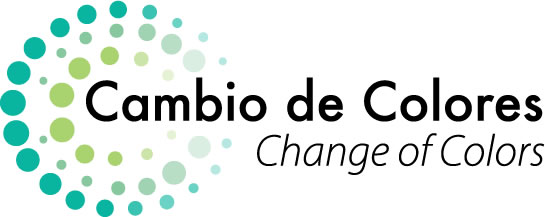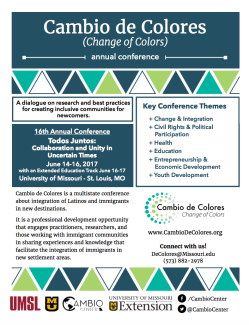About
We invite individuals and organizations to attend and participate in this year’s Cambio de Colores Conference. Please see (and share) this letter of invitation if you or your organization is interested in participating.
What is Cambio de Colores?
Cambio de Colores (Change of Colors) is a multistate conference about the integration of Latinos and immigrants in new destinations. It is a professional development opportunity that engages practitioners, researchers, and those working with immigrant communities in sharing experiences and knowledges that facilitate the integration of immigrants in new settlement areas.
What is the importance of this conference?
Rural and urban communities throughout the Midwest have been reshaped by the arrival of large numbers of Latinos, immigrants, and refugees. Over the past fifteen years, the Cambio de Colores Conference has served as a hub for stakeholders to take stock of how our communities are adapting to these changes and share experiences of how to improve immigrant integration and community wellbeing. This multidisciplinary conference has traditionally focused on native and foreign-born Latino newcomers (the majority of new arrivals in these new destination areas), but is interested in the challenges inherent in multicultural changing communities, including the experiences of all newcomers, faith groups, and marginalized groups. The integration of these very diverse groups is being studied by academics and pursued by stakeholders, as the newcomers seek to become part and parcel of the social, economic, and cultural fabric of their new communities.
The 2017 Conference
The conference theme this year is “Todos Juntos: Collaboration and Unity in Uncertain Times.” Todos Juntos means “all together”, and seeks to build collaboration across sectors and unite communities across differences in the common goal of supporting everyone’s wellbeing in our changing, multicultural communities. Diversity is our strength, especially when we work together, and now is the time for collaboration across disciplines, silos, sectors, perspectives and cultures to create bridges of opportunity.
The coming year will be one of uncertainty for many communities as unknown changes in national policy and local contexts unfold. Potential changes in national policies in immigration, healthcare, education, and others will affect many in changing communities, especially as it is not clear whether the wellbeing and needs of newcomers and ethnic and religious minorities will be valued or recognized. Local contexts have already seen changes due to the impact of anti-immigrant and other intolerant discourses, which have empowered some individuals and groups to be more vocal and active in proclaiming hate. Collaborative unity across sectors can help to stabilize and protect communities as these changes develop.
The conference convenes public and private service providers, grassroots and advocacy organizations, education and healthcare providers, academic researchers, students and extension specialists, state and local government institutions, policymakers, corporations, and newcomers themselves. The conference program focuses and builds on the sharing of university, government, and community resources, linking academic studies to the more applied perspective and best practices of people and institutions working at the heart of changing communities. This synergy is the signature characteristic of this conference, which engages a wide array of stakeholders as individuals, organizations, and communities invested in economic and social development.
Cambio de Colores serves as a unique venue to share, learn, discuss, and identify critical areas where the development of information and promising practices will facilitate the successful transition of newcomers into communities large and small. The conference organizers seek presentations, posters, and panels on the conference themes described in this call, as well as workshops targeted to community members, leaders, and officials with the tools necessary to address these changes in ways that are sustainable and beneficial to all. See details about submissions and theme groups in the following pages.
New this year, Quality Teachers for English Learners, led by University of Missouri-St. Louis’s Dr. Kim Song, and the Missouri Dual Language Network are co-hosting an Extended Education Track on Language, Literacy, and Culture during the final day of the conference and the day after (June 16-17). Submissions are invited for the main conference plus the extended education days that are focused on English Learners (ELs), bilingual education, dual language immersion education, the development of welcoming schools, and so on! Details are in the Education description on page 7 of the Call for Presentations.
Led by the University of Missouri, Cambio de Colores is a collaborative effort that includes University of Missouri Extension, the campuses of the Missouri system, and other educational institutions across the United States, as well as government and private organizations. Since 2009, the conference has benefited from the cooperation of the interstate initiative on “Latinos and Immigrants in Midwestern Communities,” North Central Education and Research Activity 216 (NCERA 216), and since 2015, has benefited from the cooperation of the Missouri Dual Language Network (MODLAN).
Theme Overviews
Change and Integration: Growing immigrant and refugee populations in the Midwestern United States and other parts of the country are making a significant impact on communities, organizations, institutions and economies. As a direct result of the demographic shift taking place, many new policies and programs are being developed and instituted at various community and state levels to facilitate integration. Change and integration are experienced differently between and among populations, so the conference aims to share and highlight studies focused on: the experiences of refugee and immigrant newcomers in their settlement and integration, bridges between local longtime residents and newcomers; maintaining cultural diversity under resource constraints; and the opportunities associated with policy and political leadership.
Civil Rights and Political Participation track: The goals of the Civil Rights and Political Participation themes are to raise awareness and to share initiatives about legal rights, civil rights, and political engagement issues that affect and involve the livelihoods and integration of Latinos, other immigrants, and historically marginalized groups, especially in new destination states and regions. Changes and potential changes on the federal level, including to DACA, DAPA, deportation priorities and ICE detention policies (including prolonged detention, racial profiling, and right to counsel), voting rights, targeted registries, and others deserve discussion, as well as ongoing attempts by state and local policymakers to address issues of immigration, and the effects those policies may be having on the integration efforts of communities.
Education track: Education plays an integral role in the continued construction and progression of our society. In addition to academic development, formal and informal institutions of education serve as sites for the development of complex social, cultural, and linguistic skills and identities. The Cambio de Colores conference offers breakout sessions and workshops that explore educational issues, policies, and practices that influence Latino/a, immigrant, and refugee learners of all ages and backgrounds.
Entrepreneurship and Economic Development: The 2017 conference theme, “Todos Juntos: Collaboration and Unity in Uncertain TImes,” is especially suited to showcase research and educational programs that both explore and enhance the involvement of Latinos and immigrants in entrepreneurial activities. Empowering economic development through this entrepreneurialism can be a key element for the sustainability and expansion of local and regional economies, given the relative youth and the risk-taking and optimistic mindset that usually characterizes immigrants. Entrepreneurship builds bridges, promotes dialogue and creates additional opportunities that benefit all community members, acting as a cornerstone for a solid integration process.
Health Track: In the age of globalization, more than ever, complexity defines health. Differences in economic circumstances, education, behavioral choices, living conditions and the physical environment can prevent newcomers in the Midwest from being as healthy as the general population, creating additional social and health inequalities. The following topics are very relevant to the conference: networking and community-based health care programs; cultural gaps and bridging; consequences of acculturation and health behavior modification; influence of race or ethnicity on doctor-patient relationship; cultural competence; traditional practices; health literacy; outreach to families with children with disabilities; domestic and sexual violence, among other topics.
Youth Development Track: This track brings together 4-H, extension specialists, researchers, and youth educators to review and engage developments in research, to share updates on implementation of best practices for including Latino and other new populations, and to work collaboratively to share these targeted curricula and projects. As Latino youth become a larger proportion of the population in both rural and urban communities, we must understand, explore, and expand the research and best practices that can lead to the successful adaptation of out-of-school programs; moral and legal imperatives obligate us to ensure inclusive and appealing learning experiences that link to youths’ well-being and educational achievement. See the Youth Development flyer for more information.

